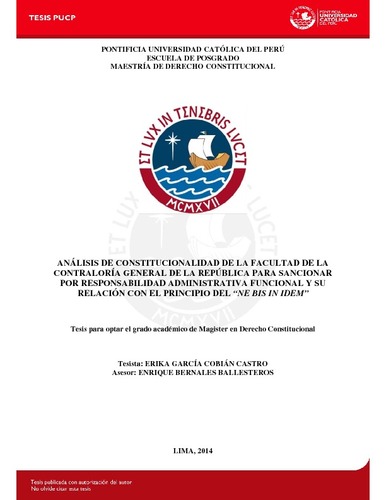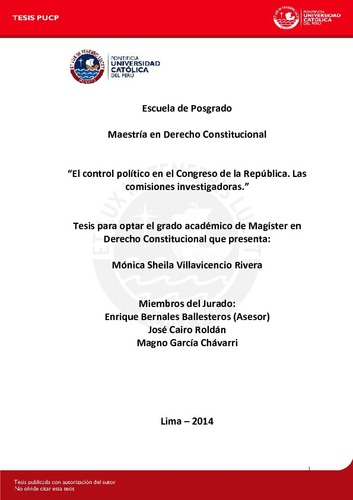El sistema se apagará debido a tareas habituales de mantenimiento. Por favor, guarde su trabajo y desconéctese.
Sentencia del 8 de setiembre de 2005 de la Corte Interamericana de Derechos Humanos: Caso Niñas Yean y Bosico vs República Dominicana
| dc.contributor.advisor | Luque Armestar, Liliana Andrea | |
| dc.contributor.author | Espino Perez, Diana Nattaly | |
| dc.date.accessioned | 2022-08-11T15:47:38Z | |
| dc.date.available | 2022-08-11T15:47:38Z | |
| dc.date.created | 2022 | |
| dc.date.issued | 2022-08-11 | |
| dc.identifier.uri | http://hdl.handle.net/20.500.12404/23045 | |
| dc.description.abstract | La violación sistemática de derechos humanos de las personas dominicanas con ascendencia haitiana, ubicadas en el Estado de República Dominicana, es un hecho que acontece hace décadas y es en el año 2005 que la Corte Interamericana de Derechos Humanos resuelve la primera sentencia que aborda esta compleja situación en relación a la violación del derecho a la nacionalidad de una población sumamente vulnerable: la niñez y adolescencia. Así, a pesar de que este Estado ha ratificado diversos tratados internacionales e incorporado normativa nacional que brinda protección a los/as niños, niñas y adolescentes que se encuentran en su jurisprudencia, la realidad evidenciada en este caso expresa lo opuesto. De esta manera, el estudio del presente trabajo académico se basa en analizar los problemas jurídicos encontrados en la sentencia, los cuales han sido divididos en seis (6) sub-acápites: i) las excepciones preliminares, ii) la violación del derecho a la niñez y la obligación de respetar todos los derechos, iii) la violación del derecho a la nacionalidad y a la igualdad ante la ley, iv) la violación del derecho al nombre y la personalidad jurídica, v) la violación del derecho a la integridad y, vi) sobre las reparaciones. Así pues, coincido con la Corte IDH sobre la violación de los derechos humanos alegados; sin embargo analizo a fondo el porqué de las decisiones expresadas por el Tribunal, exponiendo aportes basados, además del análisis social, en la necesidad de emplear un corpus iuris centrado en un enfoque de niñez (principio del interés superior de la niñez) y desde una perspectiva interseccional mencionando, además de la Convención Americana de Derechos Humanos, la inclusión de otras normativas que respaldan la protección y goce de los derechos de la niñez, como lo son la Convención de los Derechos del Niño y la Convención Belém do Pará. | es_ES |
| dc.description.abstract | The systematic violation of human rights of Dominicans with Haitian descent, located in the State of the Dominican Republic, is a fact that has been happening for decades and it is in 2005 that the Inter-American Court of Human Rights resolves the first judgment that addresses this complex situation in relation to the violation of the right to nationality of a highly vulnerable population: children and adolescents. Thus, despite the fact that this State has ratified various international treaties and incorporated national regulations that provide protection to children and adolescents that are found in its jurisprudence, the reality evidenced in this case expresses the opposite. In this way, the study of this academic work is based on analyzing the legal problems found in the judgment, which have been divided into six (6) sub-headings: i) the preliminary objections, ii) the violation of the right to childhood and the obligation to respect all rights, iii) the violation of the right to nationality and equality before the law, iv) the violation of the right to a name and legal personality, v) the violation of the right to integrity and, vi) on reparations. Thus, I agree with the Inter-American Court on the violation of the alleged human rights; however, I thoroughly analyze the reason for the decisions expressed by the Court, exposing contributions based, in addition to social analysis, on the need to use a corpus iuris focused on a childhood approach (principle of the best interests of children) and from a intersectional perspective mentioning, in addition to the American Convention on Human Rights, the inclusion of other regulations that support the protection and enjoyment of children's rights, such as the Convention on the Rights of the Child and the Belém do Pará Convention. | es_ES |
| dc.language.iso | spa | es_ES |
| dc.publisher | Pontificia Universidad Católica del Perú | es_ES |
| dc.rights | info:eu-repo/semantics/openAccess | es_ES |
| dc.rights.uri | http://creativecommons.org/licenses/by/2.5/pe/ | * |
| dc.subject | Niños--Derechos--República Dominicana | es_ES |
| dc.subject | Adolescentes----Derechos--República Dominicana | es_ES |
| dc.subject | República Dominicana--Legislación | es_ES |
| dc.subject | Derechos humanos--República Dominicana | es_ES |
| dc.title | Sentencia del 8 de setiembre de 2005 de la Corte Interamericana de Derechos Humanos: Caso Niñas Yean y Bosico vs República Dominicana | es_ES |
| dc.type | info:eu-repo/semantics/bachelorThesis | es_ES |
| thesis.degree.name | Abogado | es_ES |
| thesis.degree.level | Título Profesional | es_ES |
| thesis.degree.grantor | Pontificia Universidad Católica del Perú. Facultad de Derecho. | es_ES |
| thesis.degree.discipline | Derecho | es_ES |
| renati.advisor.dni | 43575238 | |
| renati.advisor.orcid | https://orcid.org/0000-0002-3011-5058 | es_ES |
| renati.author.dni | 72207227 | |
| renati.discipline | 215106 | es_ES |
| renati.juror | Saco Chung, Víctor | es_ES |
| renati.juror | Zafra Ramos, Rita del Pilar | es_ES |
| renati.level | https://purl.org/pe-repo/renati/level#tituloProfesional | es_ES |
| renati.type | https://purl.org/pe-repo/renati/type#trabajoDeSuficienciaProfesional | es_ES |
| dc.publisher.country | PE | es_ES |
| dc.subject.ocde | https://purl.org/pe-repo/ocde/ford#5.05.01 | es_ES |









